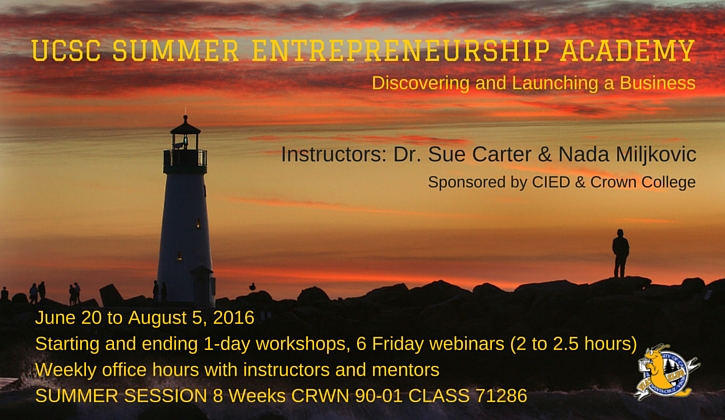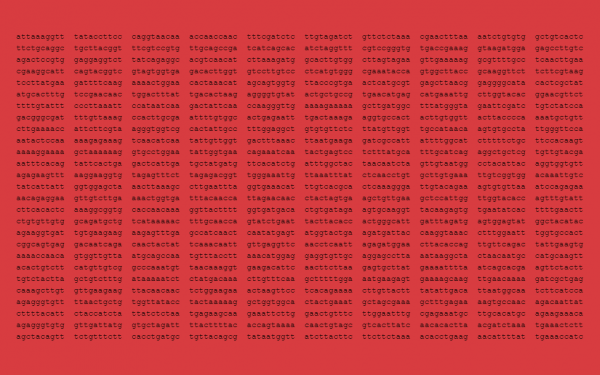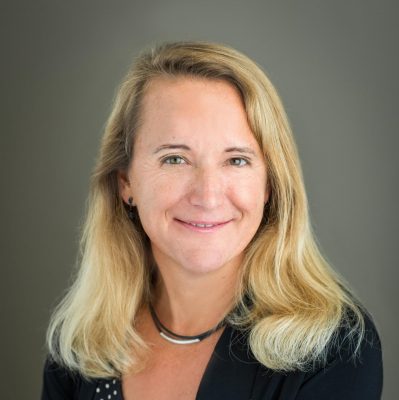Featured
Lean Launchpad: UCSC offers first business accelerator class

By Nada Miljkovic
UCSC Summer Entrepreneurship Academy
Special to Santa Cruz Tech Beat
May 5, 2016 — Santa Cruz, CA
Last August 2015, I was asked to teach the Intro to Radio and Broadcast Media class at Crown College at UCSC. I was thrilled and jumped at the opportunity. It has been my dream to teach ever since I went back to school to pursue my passion for art and teaching. In 2009, after graduating with a Master’s in Fine Arts in Digital Arts and New Media, I quit my 20+ year career as a project manager in construction and began my first startup. I kept teaching as a course assistant at UCSC. As the business developed, I switched to working full time on my business, Artist on Art.
After getting the radio class, my desire to teach was reignited and I wanted more. So, I approached Manel Camps, the Crown Provost. At our first meeting, l told Manel what a thrill it was for me to teach and that I had an idea for a class in business entrepreneurship at UCSC. College students to have a real need to plan with what they are going to do after graduation. Many are saddled with large debt and are clueless as to what to do next. He exclaimed, “perfect, that is exactly what we want.”
After that conversation, things moved quickly. Manel introduced me to Dr. Sue Carter, the director of the Center for Innovation and Entrepreneurial Development, Associate Dean of Graduate Studies, and Physics Professor. We worked together to write up the course proposal and get it approved by the appropriate people, councils, and committees. Not an easy task. Plus, we wanted this to be attractive to students by having general education credit for the class.
After a lot of work, we are thrilled to announce that this summer UCSC is offering the first business accelerator class, the Summer Entrepreneurship Academy (SEA), to both students (graduate and undergraduate) and the public.
The class, CRWN 90-01 CLASS 71286, is based on the Lean Launchpad / National Science Foundation Innovation Corps model, in which students build teams with entrepreneurial leads and mentors who have startup experience to discover and develop business plans. It is a five credit general education (creative) class.
This Lean Launchpad/NSF ICorps model is applies the scientific methodology to building a startup: develop a hypothesis, test it by developing and implementing experiments, invalidating and reiterating them. Large data sets are required. Students have to get out of the building to do interviews. We want them to talk to all the stakeholders within their potential business ecosystem.
This model is completely different from the classic waterfall company development model. The waterfall model starts with requirements which need design and then implementation after which comes verification and maintenance. Once a phase of development is completed, the development proceeds to the next phase and there is no turning back. Using this method, students have an idea they think solves an important problem. They spend resources to get a minimum viable product without first doing a comprehensive customer discovery. Because the market analysis comes late in the development process time and resources are often wasted in solving the wrong problem. In our class, SEA, we flip this model.
We start with teaching Osterwalders business canvas concept from the book Business Model Generation. We emphasize the customer discovery process. We want to get the students out of the building and talking to potential clients about their needs before committing to a business plan. We require students to have 60+ interviews completed by the end of the course. This is the data set that will allow for the patterns to emerge and be recognized. The students present their new business canvas each week reflecting the new information from their interviews.
We help students identify their customers’ needs, value propositions, key partners, channels, and market early in the idea development process via this iterative process. This way they can pivot their solution to more rapidly solve the needs of their customer. In other words, we teach them the agile business development methodology.
The course begins with an in-person, one day intensive workshop, June 20, continues with weekly webinars (2 to 2.5 hours) that are attended remotely (via adobe connect), weekly office hours, and a one day intensive workshop on the last day of the class, August 5th, when students give their final presentations. The class is mostly online. The in-person component at the start and end is critical to the effectiveness of the accelerator.
If you are interested in being involved in the formation phase as a student, member of the teaching team, principal investigator, or business mentor, please contact Sue Carter at sacarter@ucsc.edu and/or me, Nada Miljkovic at nada@ucsc.edu.
We are hosting an information session on May 12, 2016, from 2 to 3 pm, room 599 Engineering 2, UCSC. This is free and open to the public.
For more information, please visit our website, Summer Entrepreneurship Academy, and the UCSC Summer Entrepreneurship Academy Facebook page.
###
If you wish to republish this article, please follow our Terms of Use.
###
Tagged CIED, Sue Carter, UC Santa Cruz








